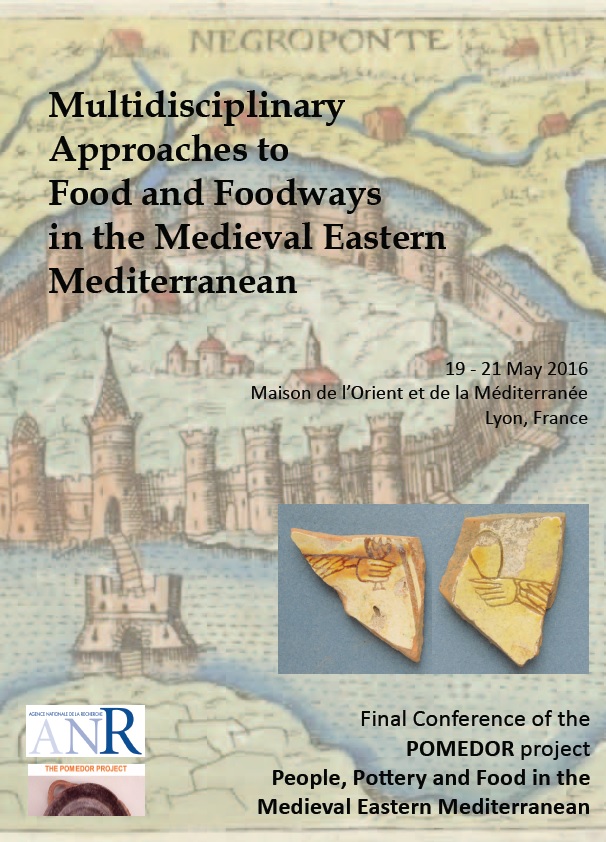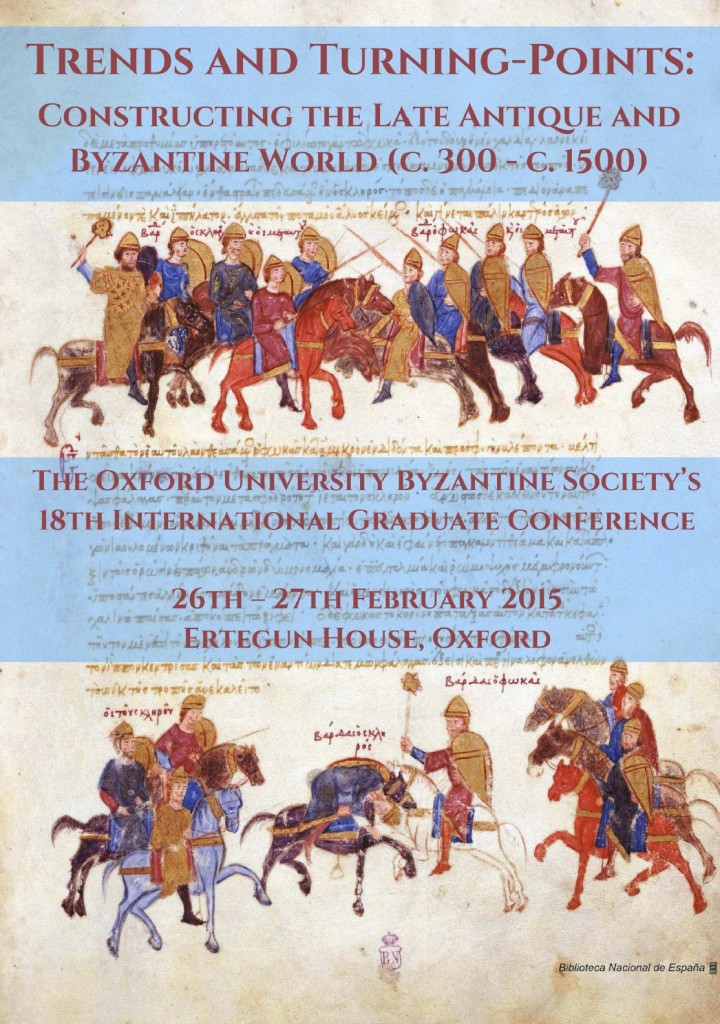 Multidisciplinary Approaches to Food and Foodways in the Medieval Eastern Mediterranean
Multidisciplinary Approaches to Food and Foodways in the Medieval Eastern Mediterranean
19-21 May 2016
Maison de l’Orient et de la Mediterranée – Lyon, France
Final conference for the POMEDOR Project « People, Pottery and Food in the Medieval Eastern Mediterranean ».
Information and registration before May 1st.
Programme:
THURSDAY 19 MAY
09h00 Registration
09h20 Welcome
09h40 “Introduction. People, Pottery and Food in the Medieval Eastern Mediterranean: the
POMEDOR Project” – S.Y. Waksman (CNRS Lyon)
10h30 Coffee Break
CYPRUS AND THE LEVANT
11h00 “Population Change in the Southern Levant as Reflected in Ceramic Production and
Consumption from the Fatimid to the Crusader Periods” – E.J. Stern (Israel Antiquities Authority),
A. Shapiro (Israel Antiquities Authority), S.Y. Waksman (CNRS Lyon)
11h30 “Food and Holy War: the Role of Food in the Crusaders’ Conduct of War and in their
Encounter with the New Land and its Inhabitants” – J. Bronstein (Haifa University)
12h00 “Eating and Drinking at Medieval Kinet” – S. Redford (University of London), C. Çakırlar
(Groningen University)
12h30 Discussion
12h45 Lunch Break
14h00 “Between « Tanur » and « Oven » – From the Early Islamic to the Crusader Kitchen” – E.
Yehuda (Tel Aviv University)
14h30 “Acre vs. Safed: An Archaeozoological Analysis of Faunal Remains from the Medieval
Holy Land” – N. Agha (Israel Antiquities Authority & Haifa University)
15h00 “Some Thoughts on Sugar Production and Sugar Pots in the Middle Islamic to Mamluk
Periods in Jordan” – R.E. Jones (Glasgow University), T. Grey (University of Wales Trinity St
David)
15h30 “Ceramic Evidence for Sugar Production in the ‘Akko Plain: Typology and Provenance
Studies” – E.J. Stern (Israel Antiquities Authority), A. Shapiro (Israel Antiquities Authority), N.
Getzov (Israel Antiquities Authority), S.Y. Waksman (CNRS Lyon)
16h00 Discussion
16h15 Coffee Break
16h45 “Du lac de Limassol aux tables de Nicosie : pêcheries et consommation de poissons à
Chypre sous la domination latine (1191-1570)” – P. Trélat (Rouen University)
17h15 “Les tavernes (canutes) comme instruments de contrôle économique et social dans le
royaume de Chypre aux XIIIe-XVIe siècles” – G. Grivaud (Rouen University)
17h45 “Food, Wine and the Latin Clergy of Lusignan Cyprus, 1191-1473” – N. Coureas (The
Cyprus Research Centre, Nicosia)
18h15 “Archaeological and Archaeometric Investigations into Cooking Wares in Frankish and
Venetian Cyprus” – R.S. Gabrieli (University of Sydney), A. Pecci (Barcelona University), A.
Shapiro (Israel Antiquities Authority), S.Y. Waksman (CNRS Lyon)
18h45 Discussion
20h00 Conference Dinner (for speakers)
Byzantine Banquet Created by S. Grainger, A. Dalby and I. Anagnostakis
Paul Bocuse Institute, Ecully
Under the Patronage of Chef Régis Marcon
FRIDAY 20 MAY
10h00 Coffee and Posters Session
BYZANTIUM AND BEYOND
11h00 “La nourriture des autres aux yeux des Byzantins (10e-14e s.): Petchénègues, Latins et
Turcs” – B. Caseau (Paris-Sorbonne University)
11h30 “The Composition of Church Festive Meals in a Medieval Christian Community in the
Southern Crimea, Based on Ceramics and Faunal Materials” – I. Teslenko (National Ukrainian
Academy of Science)
12h00 “Eating in the Aegean (ca. 700-1500): A Comparison of Pots and Pans in Athens and
Ephesus” – J.A.C. Vroom (Leiden University)
12h30 Discussion
12h45 Lunch Break
14h00 “Ceramic Vessels and Food Supplies: Chalcis as a Major Production and Distribution
Centre in the Byzantine and Frankish Periods” – N.D. Kontogiannis (Ephorate of Antiquities of
Boeotia), S.S. Skartsis (Directorate of Byzantine and Post Byzantine Antiquities, Athens), G.
Vaxevanis (Ephorate of Antiquities of Euboea), S.Y. Waksman (CNRS Lyon)
14h30 “Food Consumption in the Urban Environment; the Byzantine City as a Consumption
Centre” – E. Tzavella (Open University of Cyprus)
15h00 “L’approvisionnement de Constantinople et des cités pontiques par les Occidentaux”
– M. Balard (Paris-Sorbonne University)
15h30 Discussion
15h45 Coffee Break
16h15 “Animals in Food Consumption during the Byzantine Period in Light of the Yenikapı
Metro and Marmaray Excavations, Istanbul” – V. Onar (Istanbul University)
16h45 “Foods Consumed in Byzantine Greece: the Evidence of Biological Data and Stable
Isotope Analysis” – C. Bourbou (Ephorate of Antiquities of Chania)
17h15 “Food Production and Consumption in the Byzantine Empire in Light of the Archaeobotanical
Finds” – A. E. Reuter (Römisch-Germanisches Zentralmuseum Mainz & Kiel University)
17h45 Discussion
18h30 Public Conference
“Banquets byzantins: la gastronomie du centre du monde” – A. Dalby
SATURDAY 21 MAY
TRADING GOODS, TRADING TASTES
09h00 “Residue Analysis of Medieval Amphorae from the Eastern Mediterranean” – A. Pecci
(Barcelona University), N. Garnier (Garnier Laboratory), S.Y. Waksman (CNRS Lyon)
09h30 “One Amphora, Different Contents – the Multiple Purposes of Byzantine Amphorae
According to Written and Archaeological Data” – E. Todorova (Bulgarian Academy of
Sciences)
10h00 “Byzantine Amphorae of the 10th-13th Centuries from the Novy Svet Shipwrecks,
Crimea, the Black Sea. Preliminary Archaeological Typology and Archaeometric Studies” – S.
Zelenko (Kiev University), I. Morozova (Kiev University), S.Y. Waksman (CNRS Lyon)
10h30 Discussion
10h45 Coffee Break
11h15 “Freightage of Amphorae, Tableware and Foodstuffs in the Middle and Late Byzantine Period: the
Evidence of Shipwrecks” – G. Koutsouflakis (Ephorate of Underwater Antiquities, Athens)
11h45 “Production for Whom and for What Target: Thoughts on a Group of Wine Containers from the
Kuşadası, Kadıkalesi Excavation” – Z. Mercangöz (Ege University Izmir)
12h15 “Food Habits and Tableware in Venice: the Connections with the Mamluk Sultanate” – V. Vezzoli (Ca’
Foscari University, Venice)
12h45 Discussion
13h00 Lunch Break
BYZANTIUM AND BEYOND
14h15 “Byzantine and early Turkish Tablewares in Sèvres and the Louvre Museum: Investigations by PIXE into
Provenance and Technology” – A. Bouquillon (PSL Chimie ParisTech & C2RMF Paris), J. Burlot (Lyon University),
S.Y. Waksman (CNRS Lyon), L. Tilliard (Cité de la Céramique, Sèvres), C. Maury (Louvre Museum, Paris)
14h45 “Changing People, Dining Habits and Pottery Technologies: Tableware Productions on the Eve of the
Ottoman Empire in Western Anatolia” – J. Burlot (Lyon University), S.Y. Waksman (CNRS Lyon), B. Böhlendorf
(Römisch-Germanisches Zentralmuseum Mainz), J.A.C. Vroom (Leiden University), I. Teslenko (National Ukrainian
Academy of Science)
15h15 “Ottoman Period Sources for the Study of Pottery and Food (15th-18th centuries)” – F. Yenişehirlioğlu
(Koç University, Ankara)
15h45 Discussion
16h00 Concluding Remarks
Affiche ici.



